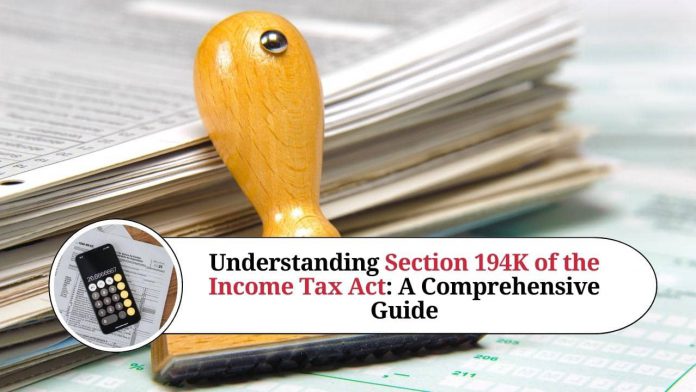Section 194K of the Income Tax Act is a provision that applies to mutual fund distributors and has significant implications for them. In this blog post, we will delve deeper into the nuances of this section to help mutual fund distributors understand its provisions and comply with its requirements.
Applicability of Section 194K
Section 194K applies to any income earned by a resident mutual fund distributor from units of mutual funds, including equity-oriented mutual funds and debt-oriented mutual funds.
TDS rate under Section 194K
The TDS rate under Section 194K is 10% of the income earned by a mutual fund distributor from units of mutual funds. It is important to note that this TDS rate is applicable on the gross amount of income earned and not just the profit earned.
Threshold limit for TDS under Section 194K
The threshold limit for TDS under Section 194K is Rs. 5,000 in a financial year. If the income earned by a mutual fund distributor from units of mutual funds is less than Rs. 5,000 in a financial year, TDS is not required to be deducted. However, if the income exceeds this limit, TDS must be deducted on the entire amount, not just the amount exceeding the threshold limit.
Compliance requirements under Section 194K
The compliance requirements under Section 194K include obtaining a Tax Deduction and Collection Account Number (TAN) and deducting TDS at the applicable rate. The TDS deducted must be deposited with the government by the 7th of the following month. The deductor is also required to file TDS returns in Form 26QC quarterly. It is important to note that non-compliance with these requirements can lead to penalties and interest charges.
Exemptions from TDS under Section 194K
There are no exemptions available from TDS under Section 194K.
Penalties for non-compliance with Section 194K
Non-compliance with Section 194K can lead to penalties and interest charges. If the payer fails to deduct TDS or deducts TDS at a lower rate than prescribed, then he/she will be liable to pay interest at the rate of 1% per month or part of the month on the amount of TDS not deducted. Additionally, a penalty may be imposed for non-compliance.
Other Useful Links:
Conclusion
Section 194K is an important provision under the Income Tax Act that applies to mutual fund distributors. Mutual fund distributors must comply with the provisions of this section to avoid penalties and interest charges. Understanding the nuances of this provision can help mutual fund distributors ensure compliance and avoid unnecessary costs.
Frequently Asked Questions About Section 194K
Q: Who is a mutual fund distributor?
A mutual fund distributor is an individual or entity that distributes mutual fund units to investors on behalf of mutual fund houses. Mutual fund distributors earn commissions for their services.
Q: Does Section 194K apply to non-resident mutual fund distributors?
No, Section 194K only applies to resident mutual fund distributors. Non-resident mutual fund distributors are subject to TDS under Section 195 of the Income Tax Act.
Q: What types of mutual funds are covered under Section 194K?
Section 194K applies to all types of mutual funds, including equity-oriented mutual funds, debt-oriented mutual funds, and hybrid mutual funds.
Q: Is it mandatory for a mutual fund distributor to obtain a TAN for TDS under Section 194K?
Yes, it is mandatory for a mutual fund distributor to obtain a TAN for TDS under Section 194K.
Q: Are there any exemptions available for senior citizens under Section 194K?
No, there are no exemptions available for senior citizens under Section 194K.
Q: Can a mutual fund distributor claim a refund of excess TDS deducted under Section 194K?
Yes, a mutual fund distributor can claim a refund of excess TDS deducted under Section 194K by filing an income tax return.
Q: Is it possible to avoid TDS under Section 194K?
No, it is not possible to avoid TDS under Section 194K. However, mutual fund distributors can reduce their tax liability by claiming deductions under Section 80C, Section 80D, and other relevant provisions of the Income Tax Act.




















